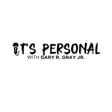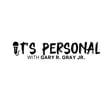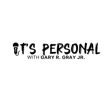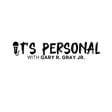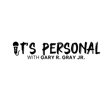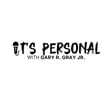Become a Creator today!Start creating today - Share your story with the world!
Start for free
00:00:00
00:00:01

#ItsPersonal III 90. Neha Sobti talks road blocks, love and books!
Neha Sobti drops by and chats with us about the many roadblocks in the current work that she does for schools and educators.
Neha is an educator/admin/organizer/writer working out of New York City. Her work is rooted in a love for making change and moving the dial a little, each and every day in hopes of creating spaces that are equitable.
Neha's work is non-stop, so we ask about her healing process and how she takes time to re-charge or get away from it all. Or does she? We also dig a little and find out why her new fiance is so amazing, and how they ended up together!
Neha is a bright soul, thank you for kicking it with us on ItsPersonalPodcast.
Twitter: https://twitter.com/nehajoya
Instagram: https://www.instagram.com/nehajoya/
Transcript
Welcome and Introductions
00:00:00
Speaker
Welcome back, everyone, to another episode of It's Personal. The last book I wrote is heavy. All right. Hey, Gary. This is DVD Superboy. My name is Randy Riebein. My name is Jared Krizovska. I don't think I'm a person that curses a little heart and just comes out to educate me. I'm excited. Hi. Hi,
Neha Soppi's Background and Work
00:00:20
Speaker
everyone. My name's Neha Soppi. I'm an educator.
00:00:24
Speaker
I'm an administrator. I am a doctoral candidate, scholar, writer. I've done some poetry. I think I can still say I'm a poet. And I am a transformative justice practitioner. Awesome. And you know what I always want to poet? I always want to poet. Yeah. You enjoy words. You enjoy writing things on paper. You're always an artist in a way. Exactly.
00:00:54
Speaker
I appreciate you saying that. Meha, I'm so interested in your story in so many different ways. I think the first thing that comes to mind is just like the work that you do around education. So can you tell me a little bit about your current job and like what is that position
00:01:15
Speaker
Yeah, definitely. So right before COVID in September, I got my admin license. And I was really lucky that a new team opened up at the Manhattan Borough Office, actually at all the district offices in New York. And it's called the Academic Response Team, which, you know,
00:01:40
Speaker
Uh, whatever that name is. Like they were joking that we were Voltron or something. I don't know. It sounds very like we're going in and we're disrupting, but I, uh, you know, I was lucky because the team was formulated
00:01:55
Speaker
to be kind of a more radical contingent in these borough offices. So we were really, you know, part of the interview questions was, how comfortable do I feel talking about race? Which I had, you know, it was shocking to me because I have been studying and talking about racism since I was 18. So, and it's never been popular.
00:02:21
Speaker
And in the last couple years, it's become popular to the point where people are asking about it. It's actually an asset. I feel like before, people would be like, oh, you're a little bit of an instigator, right? But now it's become an asset. So I actually got this job because of something that I feel like has been very challenging about, something I bring to my work.
00:02:43
Speaker
But anyway, so what I do is we have a caseload of schools and we do school improvement work. So we go in, we talk a lot to a lot of people, we visit classrooms and collaboratively with the principal and the leadership team that often includes all types of staff members. We formulate a plan for improving the school environment or their academics. And then in some way, we support that plan.
00:03:11
Speaker
And so we kind of do that in six to eight week cycles. And so it's been really cool to go from the classroom, being in the same school for seven years, and now seeing schools all over the city, meeting all types of educators. I mean, I feel like every educator should get this opportunity, every single educator to get this opportunity to improve their practice by visiting
00:03:38
Speaker
so many classrooms all over their cities, or even all over the world, kind of like your mission for this podcast, right? Because I feel like I need to go back to the classroom now after a year and a half of doing this, I just feel like now I'm such a better educator for it. So I've been really thankful in that way. Of course, it comes with working within the bureaucracy of the Department of Education in New York City, which comes with its challenges, but
00:04:08
Speaker
You know, I feel grateful. I feel grateful for how much I've learned. That's awesome. That's awesome. And I don't know a lot about the education system in New York. I enjoyed New York, but I've been there a few times and I enjoyed the city. I know it's a very fast city. I know there's a lot of young professionals there.
Challenges in Education: Roadblocks and Burnout
00:04:28
Speaker
Mayha, can you tell me some of the roadblocks that you may have encountered just maybe living in New York City or in your current job?
00:04:38
Speaker
Yeah. Um, I guess in my current job, which is kind of the Roblox that we face as educators, which is, um, I, I often feel like I, things are not changing fast enough because we have a really big liberatory vision for how we want
00:05:08
Speaker
schooling education to look like for students that look like us, for black students, for indigenous students. We have this big liberatory belief and value system around what that needs to look like, to be what it needs to be for families, for communities. And especially at this position, I feel like when you're in a school, you know, you're working on your community and it's definitely not moving fast enough at all.
00:05:37
Speaker
But you feel like you have access to impact more. And working at this type of level, it just feels like you're up against the beast that's perpetuating the beast of white supremacy. You're in the belly of the beast of white supremacy. And people aren't really ready. People aren't ready. But I think
00:06:08
Speaker
Yeah. So that's kind of the biggest challenge. Like how do I meet people where they're at while staying true to my values and really pushing while also, you know, keeping my peace, healing, healing myself, making sure I'm not burning out, making sure that I'm getting what I need out of my job, which I, which I really think a lot of educators of color don't even consider because
00:06:31
Speaker
You know, they're pouring their heart into their work. They're pouring their heart into their classroom. They're pouring their heart into everything that they do because they see themselves in their students. They see themselves in the struggles that their students are facing and they're in the parents that they're facing, the communities that you're working with. So you're pouring all of this into your job. And there's just not enough spaces for us to step back and be like, okay, but what do I, what am I getting at this time? You know, what do I need right now?
00:07:00
Speaker
Um, can't I take a moment, you know, can I get some support? Because often we're carrying the work, especially when we're in workspaces that are predominantly white, which is, which is what happens in the United States. Um, I'm not sure what it's like, where you are, but in the United States, international school still white. So yeah. Wow. Okay. Yeah, exactly. You know, and.
00:07:28
Speaker
You know, and I even grew up in white spaces and went to school in white spaces. So, you know, in my life, there hasn't been a lot of opportunities to really get to know myself outside of a white space and to heal outside of a white space. So, you know,
00:07:53
Speaker
That's obviously been a large struggle as well. Keeping my peace. Keeping my peace. Making sure that I can stay in this struggle for a long time. You know, my whole life. Just move the dial a little bit. And don't burn out. Don't burn out. I know. And that's, you know, it's funny because that was my next question. Yeah. We need you. Like, we need you as an educator. We need you as a voice. So what do educators do?
00:08:23
Speaker
to help themselves not burn out. What are some things you are doing to help yourself find that space in your head, in your life where you are resting and sleeping, reading, whatever it is? What are you doing? I don't know. I'm figuring it out. I haven't figured it out. I definitely haven't figured it out.
00:08:46
Speaker
I hear from a lot of educators, whenever I talk about it, I hear from a lot of educators, like, thank you for seeing me, like, because it's such a pervasive problem in our system, because I even think the healing spaces and the anti-racist and the, you know, diversity and inclusion spaces that are supposed to be healing for us are actually traumatizing us because of how they've been created. So, you know,
00:09:15
Speaker
what can I feel the, you know, so given that reality, that it's not going to come from above, we can't if no one's going to be giving us the healing spaces, right? Like because because
00:09:28
Speaker
The bureaucracy, the racial capitalism, they don't want us to heal. That's not part of the mission for teachers to be healing themselves and people of color to be healing themselves. That's not part of the mission. So, you know, they want us to be worn out. So part of that is just recognizing, OK, I can't be asking for these spaces. I have to create them.
00:09:49
Speaker
And I have to create them in my own life and I have to create them within my school for other educators of color because no one's going to create them for us, sadly. And then I think something that's just like battling with the guilt of it, right? Like I think what's part of what stops us is that there's some level of guilt that we're grappling with.
00:10:16
Speaker
for taking time for ourselves, for taking time to heal ourselves, to rest. Because we are, it feels like such a desperate need for us to pour more and more energy into our work because, like I said, we see ourselves
00:10:37
Speaker
in the struggles that of our students. We really see ourselves. So it's a desperate thing. We're almost like saving ourselves as we work with our students sometimes. It's so personal. Like I remember one of my really good friends and co-workers at my old school, we would cry. She's a Black woman, also a math teacher. We would cry in the hallway sometimes. Like we aren't doing enough, right? Like that type of
00:11:04
Speaker
just we're not doing enough is is so deep and so and I investigating where that comes from that feeling and healing that a little bit.
00:11:17
Speaker
And I think the other thing is just find your people in your space, whoever that is, who sees you, who really sees you, those people, and really build relationships and community with them because that's where you're going to be able to heal, right? If you can find even one or two people that can be your people in the space that you're in,
00:11:37
Speaker
Um, to vent, but also like really deeply build relationships and healing together, then that's going to be, that's going to be a game changer for you. Cause if you feel alone, if you're like the only person, uh, that's going to be really rough. I would say quit and find another job because it's just, that's, that's a really hard thing that I can't even imagine, you know, not having either one person. Wow.
Self-Care and Supportive Communities
00:12:02
Speaker
Yeah, well, and I think it's so important that you mentioned that we have to be careful with the space of that who creates the space and where the spaces are when we're thinking about healing. For me, I think it's just like, I think you talked about it a little bit earlier. It's just, I think therapy is super important. I know it's not, we don't have access to it, obviously, based on a variety of reasons, of course, but
00:12:29
Speaker
I think it's definitely an option if it's there, if you are willing to. I think that it's difficult sometimes for people like me at least to put myself out there and like accept that I need to go to therapy. And that's been a journey for me this year. And that's been something that I've been really trying to lean in on and use as, I don't want to say a few, but just to like
00:12:53
Speaker
heal myself from a lot of the things that have been going on, different sets, the different work that I've been trying to do. I think your words are so important. I think it's really key for us to really find the things that we need to continue the work and whether that is slowing down, whether it's finding support in a friend or a family member or whatever it is, because we need to be
00:13:25
Speaker
And I'm going to switch gears just a little bit. So when we were talking earlier, you mentioned, I don't know what to call him. I want to say Beyonce. Can you share a little bit about him and your guys' journey when it comes to just being together? Yeah. Yes.
00:13:54
Speaker
Uh, yeah, so we were teaching at the same school together. Um, we were really close friends. Um, he is, he is black Dominican. Um, and he is a phys ed teacher. And at the time he was a Dean at my school. Uh, and I don't know, we just, we were friends for like three, two, three years before we got together. Um, and,
00:14:22
Speaker
We were really good friends. I don't know. We were definitely flirting. We were into that. But I was just in his room all the time. I just felt like we connected at some kind of really deep level, even though our backgrounds were totally different. We grew up in totally different environments. I grew up in suburban Texas. We grew up in New York City, like totally different. But there's just something between us that's just deep
00:14:51
Speaker
um like we've known each other our whole our whole lifetimes you know like there's just something there's just something there that's just undeniable uh and i think i think the best part of our relationship to me to me is well no there's so many good things i don't even know uh it's so crazy how i talk about him i'm like giggling but um
00:15:15
Speaker
Yeah, one of the best parts of our relationship is that we just have a humor together that no one else gets like this very childish type of humor that I just so value in our relationship. Like we can just joke about, we can just joke all day about nonsense and it's beautiful. You know, once I got into a relationship with Omar, I just like that aspect of unconditional love is something
00:15:42
Speaker
That's so beautiful. And once you find it, it's like, I'm never letting this go. I'm never letting this go. Like it's, it's beautiful. You just feel seen, um, you know, through the fights, through everything, you know, there's this, there's this, you see each other and you're, you know, you know,
00:16:00
Speaker
Yeah, I love that. And I love that you're both. We again talked about this before we came on. I love that you're both into education as well. My wife is a teacher as well. And yeah, it's so it's cool to be in the same world, obviously, and just to get each other on that level. And then on top of that,
00:16:21
Speaker
to be together all the time. It's just, it is beautiful. It really is. And my wife is from a different background as well. So we have so much in common. I know. We're going to hang out someday. I know. I can't wait to meet you guys. Honestly, I feel like you guys are going to be such good friends. We will. We will be good friends. I know we will. I just have one more question for you.
00:16:45
Speaker
And this is simply about interest. And I think based on the work that you do, I think it's important that I ask this question because I think this is what some people ask just from the audience or from the guests as well.
Resources and Inspirations in Education
00:17:00
Speaker
What are you like reading right now? What do you do in regards to the work? How do you find your resources? What can you share with the audience in regards to helping them learn more about the work that you do? Okay.
00:17:14
Speaker
I came prepared for this question. All right, so some books that I'm reading, all right. First of all, I discovered Buddhism when I was 20, but in a white space. So I really needed some healing around that. A lot of healing because, as I said, a lot of the healing spaces, especially even the ones that are centered in Eastern practice, like
00:17:43
Speaker
you know, have been colonized. And if you're growing up in the United States, you know, a lot of a lot of these practices like yoga meditation have been completely co-opted. So a lot of the spaces are white. And that's where we learn our industrial knowledge. No, no, no. So I really appreciate this work. Radical Dharma and Lama Rod Owens came up with came out with a new one recently. Also, that's brilliant.
00:18:13
Speaker
Um, so this one's really about healing liberation in the context and doing that racial healing. Um, and then this one I haven't read, but I'm really excited about cause I've heard him speak my grandmother's hands. Have you ever seen this? It's also around, um,
00:18:30
Speaker
racial trauma and healing from our racial trauma. It even has like some exercises that you can do in it, which is amazing. And then of course, if you're interested in transformative justice or restorative justice, Maryam Kaba is like the guru. So this book just came out and it's gonna be like the whole, you know, this is gonna be like the mantra of the movement. So this is an amazing book. And then other than that, it's like,
00:19:00
Speaker
I learned by being in community with other practitioners because we all approach the work differently through our own lived experiences and it means something different to all of us and because it's such an organic process and it's so based on the community that you're in is what it looks like, right?
00:19:24
Speaker
just being, getting access because we're sort of in transformative justice has also been colonized and co-opted by white institutions. So you want to make sure that who are you learning these indigenous practices from?
00:19:39
Speaker
Are you going? Are the people that you're learning it from indigenous? Are they black? Are they other people of color, right? Like, are you going or are you learning it from in this organization as all white? That's like a huge red flag that they have completely co-opted this movement because these are deep-seated indigenous practices grounded in the values and paradigms of indigenous communities.
00:20:08
Speaker
You can't learn that unless you are getting it from the root. And so you want to be really careful. And like one organization that I've been following and working with closely is Amplify RJ that I think is great. But there's so many organizations out there that do great work. But you just want to make sure like, are you being a community with people of color? Because it's a totally different thing. It's a totally different thing.
00:20:36
Speaker
You're awesome. You're awesome. I love that you came through. Of course you did. Educators always come through. I was like, I know he could ask me what I've been reading and I'm so bad at, you know, I'm so bad at details. So I, I can't remember. Educators, all educators are always like the one that keeps us ahead. I love it. I know. I love it. Neha, where can people find you online?
Social Media and Contact Information
00:21:02
Speaker
Okay, so on Instagram and Twitter, I'm at a ha joya n e h a j o y a. Thank you so much. That was so fun. I'm so excited about this. It's so good to meet you.
